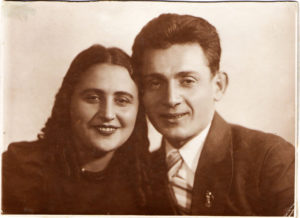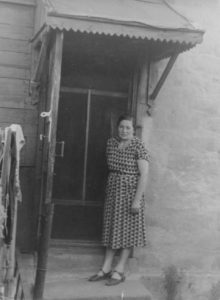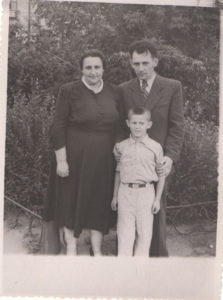My father told me that I had a baby carriage from America. America supplied a lot of things at that time—so maybe that was not so unusual. But the story is that the baby carriage was given to my mother by a General in the military school where my father was employed, whose intentions were questionable. My mother Sara was an attractive woman, I was told. She looks beautiful in the few pictures I have of her. But I never knew her, because she died when I was nine months old.
The Great Patriotic War was over for Russia in May 1945, and my mother died a few months later at the age of 36. I was told that she had typhoid and that someone gave her a piece of bread, which was like poison for her system. I have no idea if this is true, but this is what I was told. I was told a lot of things but I never had an honest conversation with my father about my mother, even though my father lived to be 84 years old and immigrated to the U.S. with me. I was always afraid to hear the truth from him, and I am still piecing together many mysteries of my own life and his.
For example, I remember hearing that I was sent to St. Petersburg from Tbilisi when I was a baby. It probably means that my father took me there hoping one of his brothers or sisters would help with me, but that did not happen. Instead, I was sent hundreds of miles away to Samara (at that time called Kuybyshev, USSR), where I was raised by my mother’s sister—my aunt, Maria Markovna Gitlin.
My aunt Maria Gitlin (“Manya”) was a kind and wonderful person. I called her “mother” and for a very long time I was not told the truth, though I suspected something was not right because I overheard whispers of the adults. My father, who lived in St. Petersburg, often sent parcels and sometimes he visited us. Since I knew he was my father, naturally I assumed that he was my aunt’s husband. Instead of being told the truth, I was under the painful impression that my father had left my mother and that he lived with another woman in St. Petersburg.
Another experience made me question my identity. My aunt often locked me in the room when she had to go out. She probably did it for my safety but it was frightening to be locked in a room alone. I still remember the shape of the keyhole and trying to make a key from a piece of bread or a piece of paper to get out. When I became old enough to read, during these times I found letters my aunt had written, searching for her lost husband. This was her tragedy; her husband had disappeared during Stalin’s time. But I only understood her pain later; at the time the tragedy for me was the dawning realization she was not actually my mother.


